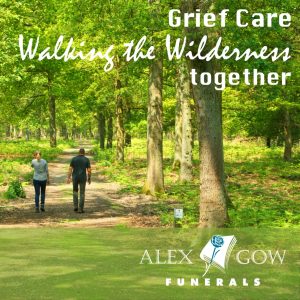...still family-owned.
Grief Care – Walking the Wilderness Together
THE CHALLENGE FOR MANY CAREGIVERS IS TO STAY ON THE THRESHOLD OF THE WILDERNESS WITHOUT CONSCIOUSLY OR UNCONSCIOUSLY DEMANDING OR PROJECTING A DESIRE FOR RESOLUTION. IN OTHER WORDS, THERE IS A TENDENCY TO BE ATTACHED TO OUTCOME, NOT OPEN TO OUTCOME.
Going into the wilderness of the soul with another human being is anchored in walking with them through spiritual distress without thinking it is necessary to attain resolution or recovery. Being in the wilderness relates to being in a liminal space – that spiritual place where most people hate to be, but where the experience of grief leads them. This is often where the griever’s world view – the set of beliefs about how the world functions and what place they as individuals occupy therein – comes into question.
Putting one’s shattered world view back together paradoxically requires companions who do not think that their helping role is to fix or give answers. There is no technique, no formula, no prescription for the wilderness experience.
A critical part of being present to someone in the wilderness of the soul is to be open to states of not knowing the outcome or trying to force the outcome. Most people have trouble trusting in this process and feel an instinctive need to get the mourner out of the wilderness. We have become a people who demand answers, explanations and expect fast and efficient resolutions.
THE AMBIGUITY OF LOSS
We don’t like pain, sadness, anxiety, ambiguity, loss of control – all normal symptoms of grief. We want to experience light before we encounter darkness. If we as caregivers cannot be still in the presence of these care-eliciting symptoms, we will be tempted to explain or treat them away. After all, we falsely think that any explanation is better than being in liminal space. A sense of control is better than the terrible “cloud of unknowing.” Yet, the opposite of control is actually participation – in this context, participation in the work of mourning while one is “under reconstruction.”
The challenge for many caregivers is to stay on the threshold of the wilderness without consciously or unconsciously demanding or projecting a desire for resolution. In other words, there is a tendency to be attached to an outcome, rather than open to outcome.
Sadly, many people, caregivers and lay public alike, have come to regard grief as an enemy. Brokenness is not something we choose to invite in. Instead of honouring the wise words of Joseph Addison, who once said, “I will indulge my sorrows, and give way to all the pangs and fury of despair,” our contemporary mantra seems to be more aligned with the words of the Bobby McFerrin song: “Don’t Worry, Be Happy!”
THE NO PLACE THAT IS GRIEF
Ancient cultures seemed to understand the value of being in the wilderness as a part of any kind of major transition in life’s journey. They often invited themselves into the wilderness through experiences such as spending 40 days in the desert, climbing to the mountain tops and taking solo journeys into the ocean. To reach the final destination, the journeyer first had to experience going nowhere before building a new person and place again.
This resonates with my experience of companioning people in life transitions. It seems we cannot integrate loss into our lives until we embrace the fear and sometimes raw terror of going to this “no place” wilderness. Then and only then do we begin to notice that something slowly shifts as we open our hearts to the pain of grief.
Of course, there are powerful forces that invite mourners to do otherwise. We are told to keep busy, to carry on.
Following these mourning-avoidant scripts, the griever may try to retrace steps back to a time or place that feels familiar, a place to find one’s “old self” – but that old self is gone forever. Being temporarily lost in the wilderness of grief is now that familiar place. Slowly, over time and with gentle companions, the mourner can search for renewed meaning and discover a new self.
The discomfort and mystery of being in the wilderness are meant to be. In reality, it is a purification phase – just one phase of the journey that will slowly change into something else. The important thing is to learn to honour and respect this process and to lean into it despite the instinct to do otherwise.
DETACHMENT AND GRIEF
Central to not being attached to outcome is the concept of detachment. The majority of westerners think of detachment as a lack of warmth and caring. Yet, linguistically, the word detachment is often defined as “the capacity to come deeply from an objective place.” Considered from this perspective, detachment can be seen as not trying to control what you can’t control. It is observing what the soul is teaching and not trying to change it while recognizing that going through grief is more necessary than going around it.
When you are detached, you are still present to the deep soul work taking place. You care in a way that allows you to be totally present to what is there rather than what you wish was there. You are able to acknowledge that less effort is sometimes better.
NEW MODELS OF GRIEF CARE
This orientation to caring is in contrast to modern psychological approaches that tend toward a more rational and logical understanding of matters of the heart. Modern psychology invites people to identify a problem and fix it. Few models exist wherein we see the value of soul and symptoms of distress that need to be reflected on, observed and respected.
We need soul-based models of caring that demonstrate the sensitivity of the heart. We need models that allow mourners to stay open to the mystery as they encounter the wilderness of their grief. We need models that respect that we don’t have to understand and control everything that surrounds us. Maybe only after discovering the liminal space of the wilderness, in which we do not understand, can we patiently discover renewed meaning and purpose of continued living?
SURRENDERING TO GRIEF
In my experience, “understanding” comes when we as companions help the grievers surrender: surrender any need to compare their grief (it’s not a competition); surrender any self-critical judgments (self-compassion is a critical ingredient to integrating loss into life); and surrender any need to completely understand (we never do because the mystery is something to be pondered, not explained).
Surrendering to the wilderness of grief is a courageous choice and an act of faith. Grieving people can only hold this mystery in their hearts and surround themselves with compassionate, non-judgmental companions.
Grief work is still being done even when the mourner feels like they are doing nothing. There will be times when they feel like they are backtracking and being ravaged by the forces around them. This, too, is the nature of grief. Complete mastery of a wilderness experience is not possible. Just as we cannot control the winds and storms and the beasts in nature, we can never have total dominion over our grief.





